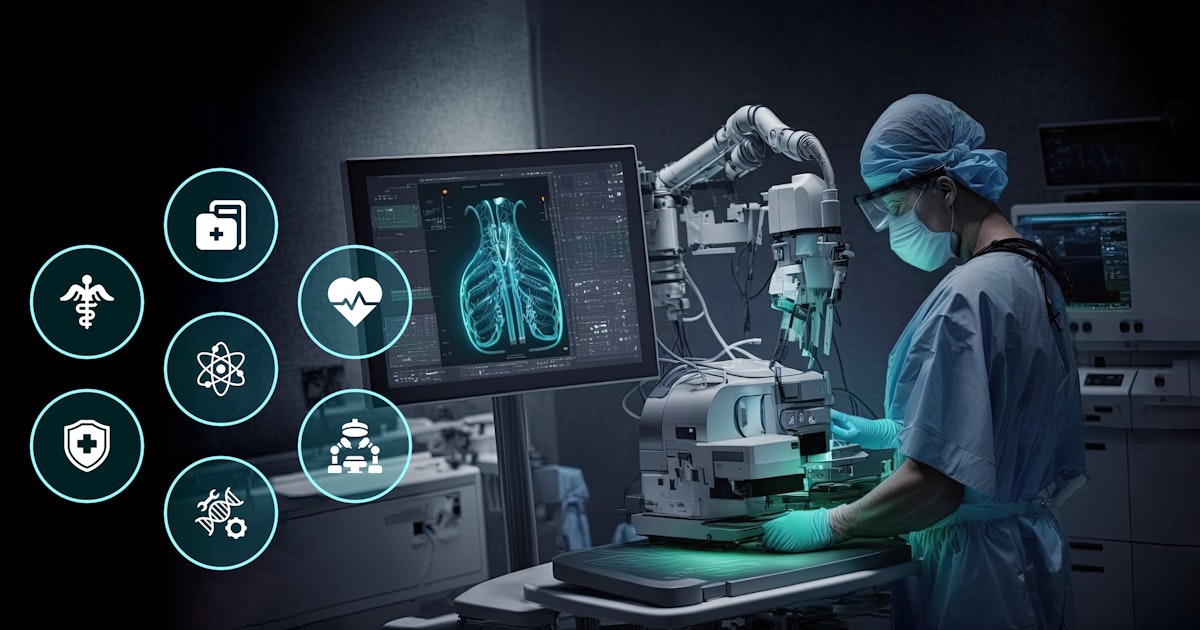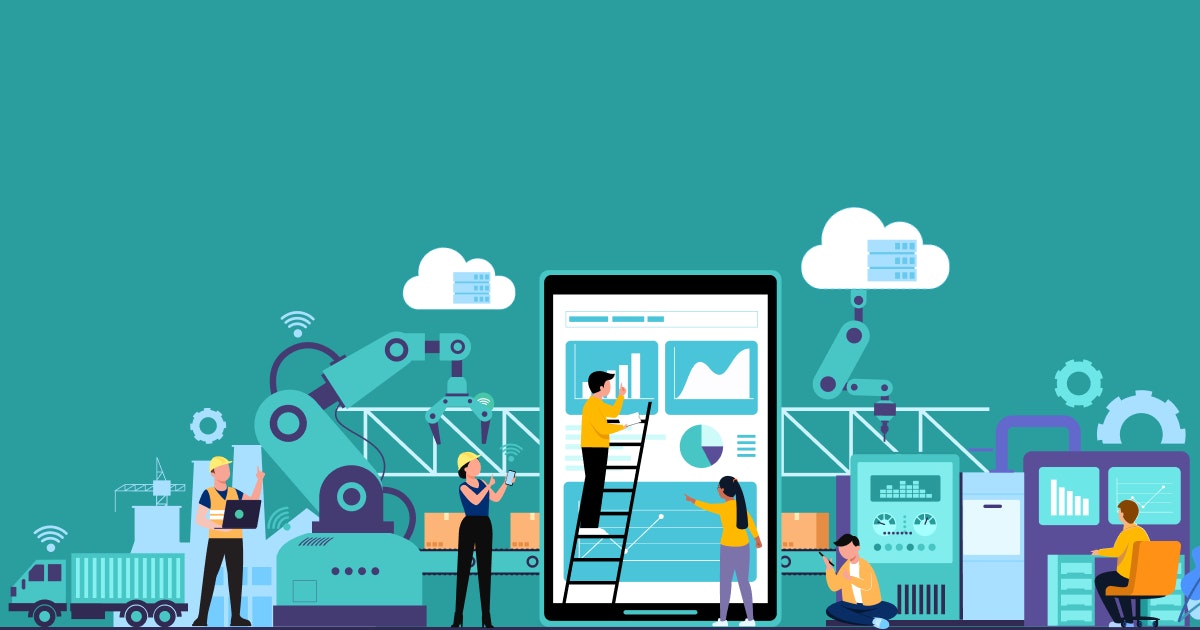The pharmaceutical manufacturing industry is enormous. It comprises complicated supply chains and over-particular chemical processes and products that must always meet stringent quality controls. After all — human life is at stake here.
Those not a part of the industry often do not think about how drugs are made safely, efficiently, and at scale. What is even more interesting is that pharmaceutical manufacturing is decades out of date and in desperate need of digital transformation.
That is where the concept of the Internet of Things enters the picture. Yes, that is correct. Typically, IoT has contributed to improving the entire supply chain process and logistics monitoring and boosting overall productivity cost-effectively.
IoT trackers and sensors primarily ensure flawless management of chemicals and biomaterials during the production process, equipment functioning at optimal capacities, and the prevention of medical fraud. The pharma businesses are genuinely on a roll!
IoT spending in the pharmaceutical manufacturing
With the excellent prospects that IoT brings to the table, it is not surprising to see the pharmaceutical industry now spend extensively on deploying efficient technologies for its good. Unlike other domains, the pharma industry has also laid its roots in R&D for IoT-enabled smart devices.
Key factors driving the IoT in pharmaceuticals include active patient engagement and remote patient care, a much-needed solution especially during the pandemic when staying home and safe is the new mantra for healthy living. Plus, IoT-based automation saves time and improves revenue for pharma businesses.
The industry is adopting IoT technologies in their manufacturing plants to improve the efficiency of their machines and processes and improve efficiency. As mentioned earlier, the traditional techniques were time-consuming and susceptible to human error, unlike the newly integrated plant operations.
Major challenges in manufacturing in a pharma industry
However, despite the positives and the increased reliance on IoT, pharma businesses still struggle to work with the medical technology they want. It is said overcoming challenges paves the way for improvement. So, it is essential to address the pain points hindering the efficiency and productivity of the pharma manufacturing industry. The following section discusses that:
Implement Predictive Maintenance in Your Pharma Facility with IoT!
Contact Us1. Batch production and the difficulties in the transition
Accelerating drug development is necessary but pharmaceutical companies cannot help but produce drugs in batches. The process involves mixing various chemical ingredients in huge quantities. Each step in the production process takes time, and it is not possible to skip those steps, especially when measuring the quality of each intermediate product is in question.
Moreover, machinery is not used continuously as the entire production does not happen at one facility, which means there are breaks in the process that need to be monitored.
The pharmaceutical industry distributes information on quality checks, product conditions, research status, and dispatch details among different systems. Some critical data is also stored in paper-based logs.
Manufacturing would be much more efficient if the process was continuous and could respond more flexibly to demand. The pharma industry needs to invest in research and development to deploy IoT mechanisms pronto.
2. A heavily regulated system; impossible to be flexible
Pharmaceutical manufacturing involves producing drugs, medicines, medical instruments. All of these products are crucial for patient care and hospital management.
Given the nature of the business that is all about saving and safeguarding human lives, there are strict protocols in place around production, operation, and approvals. Each stage of manufacturing needs regulatory permission and checks.
However, there is a flip side. Too much regulation delays the production process. It becomes challenging to meet the consumer demand and expand the business for pharmaceutical industries besides patient adherence to hundreds of administrative norms and rules.
Such heavy checks in the life sciences industries make it difficult for the company to move away from traditional manufacturing processes to new IoT-driven systems.
Although governments worldwide are working towards easing the process of obtaining permissions and lowering the number of steps to kickstart pharma operations or expand units, there is still a long way to go.
Impact of IoT sensors on pharma companies
Future-facing pharmaceutical companies understand that smart devices have a role in everything — from prompting patients to take medication on time to creating intuitive, real-time data flows that revolutionize the development of new drugs and treatments.
Whether smart pills, connected inhalers, wearables, or implanted devices, new sensor technologies are bursting at the seam in the pharma space to potentially transform both patient outcomes and the fortunes of traditional pharma companies. Let us understand the real impact of IoT sensors in the pharmaceutical industry:
1. Real-time decision-making
Pharma IoT monitoring sensors are a crucial differentiator for enabling automation. The pharmaceutical industry can deploy IoT sensors on the production floor to manage the complete supply chain. They can monitor and operate all the departments remotely.
Since sensors provide real-time data, this can help make operational and managerial decisions via pharma manufacturing automation.
2. Transparent product location
The IoT sensor technology streamlines the logistics and shipping, and delivery processes for pharma companies. As sensors provide real-time visibility of the inventory in transit, warehouse management can be more efficient, reducing theft or any other mishaps en route.
3. Stability in the production environment
Environmental factors matter a lot in pharma manufacturing because the latter deals with chemicals and other vital ingredients. IoT-based sensors provide accurate data about temperature, humidity, radiation, and so on, which is helpful in manufacturing and storing meds.
4. Boosted bottom lines
Real-time data management leads to cost-efficient operations, reduced wastage, faster clinical trials, better use and performance of equipment, and an overall boost in productivity in the pharmaceutical industry. This ultimately has a positive impact on the bottom line.
5. Standardization in the facility
IoT sensors ensure that everything in a facility remains prim n' proper by connecting equipment, networks, and systems and sharing up-to-date information across the plant floor. Automating pharmaceutical manufacturing helps eliminate all barriers to effective communication.
A Dutch anti-counterfeiting solutions provider, AntTail, for instance, makes small IoT sensors, which can be placed directly on the package or the walls of the building. These sensors can control the manufacturing and last-mile delivery stages — right to the patient's house.
Eight applications of IoT in pharmaceutical manufacturing
If a company strives for innovation, there is no room for lagging because of technology. Similar to AI and Machine Learning, the Internet of Things (IoT) offers the pharmaceutical industry a range of new opportunities, including preventative equipment maintenance, improved supply chain management, better control of drug manufacturing.
IoT trackers and sensors, specifically, can enable optimal conditions for handling biomaterials and chemicals that ensure seamless equipment operation and assistance in drug fraud prevention. That is why we see a large number of life science companies invest in IoT now. Adding to that thought, here are eight applications of IoT in pharma you should know about:
1. Effective inventory tracking and management
In layman's words, IoT-enabled devices connect humans and machines. They enable a communication channel that is efficient, seamless, and error-free. Similarly, IoT technology provides a cost-effective mechanism for tracking and management of inventory in real time.
Pharma production deals with certain risks such as raw material substitution, counterfeit drug production, stock theft, and so on.
The deployment of IoT-based devices is an ideal solution to minimize these risks. The innovative technology can track the product's location — right down to its source — to ensure zero crimes or delays in shipment and optimum manufacturing speed.
How does IoT track at the source?
RFID tags and barcodes with 5G transmission work as data collectors at entry and exit points. These IoT-enabled new-age devices collect data from shipping and receiving stations.
After that, the system compares the data received from the warehouses and production centers to verify the consistency and reliability of the received data.
IoT devices also predict the need to re-stock. Yes, that is right. The devices can solve the age-old problem of meeting demand with supply due to timely pharmaceutical manufacturing.
2. Seamless supply chain management and logistics facilitation
The IoT technology provides complete control at every step of the supply chain management process. Pharma companies remotely manage every department, production floor, and goods in transit. They make data-based decisions in less time than the traditional system of SCM.
IoT-enabled systems provide the following benefits for pharma businesses:
a. Flawed batches removed from the supply chain
Batches for drug manufacturing have an exit date, but sometimes they are recalled by error. IoT technology tracks such batches and removes them from the supply chain.
b. Predictive analysis for demand and supply
They estimate how much stock needs to be produced through predictive analytics, thus bridging the gap between demand and supply. Moreover, given the times we live in, easy access to medicines and health is essential.
Any mishaps such as worker accidents, breakdown of machinery, sudden weather changes, and so on could affect patients and hospital operations adversely. IoT helps keep these factors in check with the help of predictive analysis.
IoT-based systems track the vehicles in transit through GPS in real-time, predict weather conditions almost accurately, collect data through RFID tags, and facilitate remedial measures on the spot. In the process, IoT saves time, and money and builds customer trust for the pharma companies.
3. Advanced patient support
Pharmaceutical manufacturers produce IoT-enabled smart pills and implants for better patient care and informed medical administration globally by doctors and medical practitioners.
Simply put, smart pills are another miracle from the Internet of Medical Things (IoMT) comprising highly innovative features such as imaging, medicine delivery, sensing, and so on.
These miniature IoT devices are designed and shaped as capsules and contain pH or chemical sensors and image or biosensors.
On the other hand, medical implants are IoT-enabled body implants, tissues, or devices placed on the surface or inside the body. The pharmaceutical sector manufactures medical implants for health professionals and hospitals.
These medical products monitor body functions, tissues or organ support, delivery of medication, and the performance of prosthetics in real time.
IoT-enabled smart pills and implant devices provide reminders if the patient forgets to take their medication on time, detect changes in their body, and inform their doctor. These devices also notify the patients about the effectiveness of the medicines on their health.
Another patient-friendly device from IoT is smart sensors. These advanced devices are equipped to remind the patients about the ideal temperature to store the drugs and send notifications to them for taking their medicines on time.
4. IoT-powered smart wearable devices
Pharma companies use IoT-enabled wearables to take feedback from patients in real time. These devices detect and rectify errors across the supply chain.
Data from IoT wearables helps health care practitioners to prescribe personalized medicines. These cutting-edge medical devices decrease the treatment period and improve the impact of the medication.
IoT in pharmaceutical manufacturing encourages patients for wearables to take medication as per the schedule and ensure a better and faster recovery.
Real-time data helps pharma companies and medical practitioners to analyze the patient's condition and take measures to improve their health and overall clinical experience. IoT boosts the productivity of healthcare professionals and the efficiency of patient care.
Examples of IoT-based wearables in the pharma Industry:
- Robotic surgery
- Ingestible sensors
- Connected inhalers
- Connected contact lenses
- Monitoring devices for the heart
Here is a trend you must know about The market value for IoT-enabled healthcare devices is expected to reach $176 billion by 2026.
5. Clinical trials with IoT-enabled devices
Pharma companies use industrial monitoring devices powered by the Internet of Things for clinical trials. IoT devices provide real-time data concerning the experiment and are much quicker and more accurate than traditional clinical trials.
Faster trial results help in averting medical emergencies and improve the quality of the test. IoT-enabled devices ensure patient safety as pharmaceutical manufacturing companies collect patients' data with wearables, sensors, and other IoT devices.
IoT also helps accumulate data based on physiological aspects and uploads it to the cloud. This fact-based data helps in making calculated planning for the manufacturing and sales of drugs and medical equipment.
6. Quality control in pharma production
The Internet of Things or IoT monitors the supply chain and conducts quality checks at every step. Here are a few activities that are possible because of the technology:
- They track and monitor past events for any discrepancies.
- IoT sensors detect and inform about changes in temperature, humidity, and radiation.
- IoT devices upload the manufacturing protocol to the cloud during the entire production process.
- They ensure the participation of all required elements in the production of the final product.
- Suggestions in real-time for performance and productivity enhancement are possible because of IoT devices.
IoT sensors and systems assess the exact requirements of raw materials and malfunctioning equipment. An informed patient and a transparent system also reduce the cases of the sale and purchase of counterfeit medicines.
7. Improvement in patient compliance
The Internet of Things has improved patient's compliance towards healthcare, which has had a positive impact on the pharma industry. You see, patients can do much more than just text messaging through IoT devices.
Pharma companies can use patients' experiences to improve their products. They can receive feedback in real-time and market their products faster.
Healthcare professionals and pharma companies can track, monitor, and suggest remotely through various wearables, smart pills, and implants.
Pharma companies also invest in IoMT app development to communicate with end-users. Such solution providers tailor-make products as per the patient's requirements.
8. Predictive analysis of equipment maintenance
The traditional manual asset monitoring and scheduling system for standard equipment maintenance is outdated, expensive, and resource-intensive with a larger scope of human error. IoT-enabled systems deploy predictive analytics to address such bottlenecks.
The technology helps in reducing sudden downtime, maintenance costs, and human errors, thereby improving productivity and product quality.
Let's Optimize Your Pharma Supply Chain with IoT Integration!
Contact UsOver to you
There is no doubt that IoT implementation was comparatively slow in the pharmaceutical industry because of the nature of business. However, things are on the mend, and pharma businesses are slowly realizing how badly they need to transform with IoT digitally
Thankfully, the technology offers innovative solutions to better production practices, effectively track and monitor shipment, and manufacture new-age medicines. IoT is a much-required investment for improving productivity, reducing waste, minimizing human errors, and saving more lives.
So if your goal is also to improve staff productivity, patient care, and asset use, Intuz will help you build and integrate innovative IoT apps into your internal processes.
Book a Free 45-minute Consultation with Our IoT Experts Today! Get a customized roadmap and strategies to leverage IoT for your pharmaceutical business.





